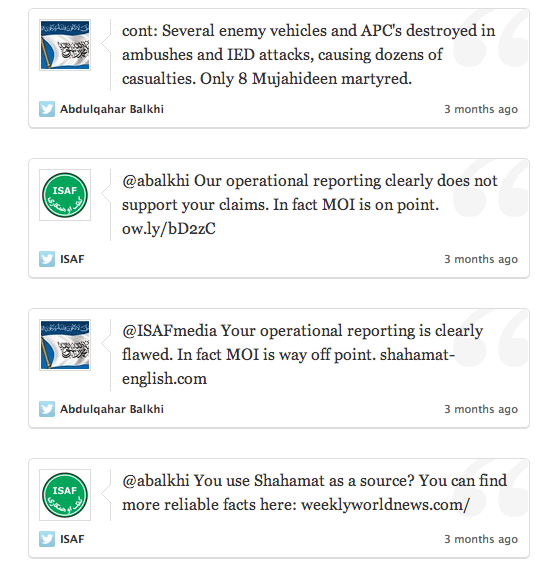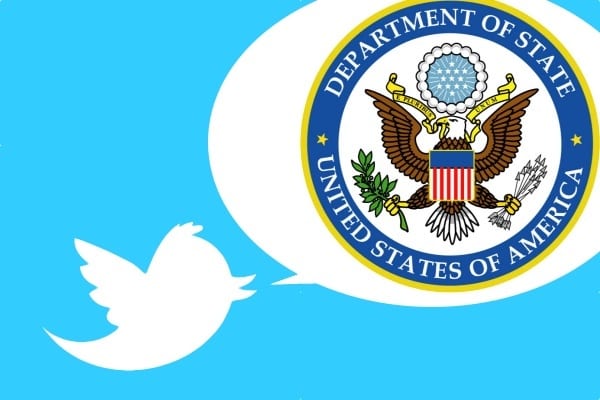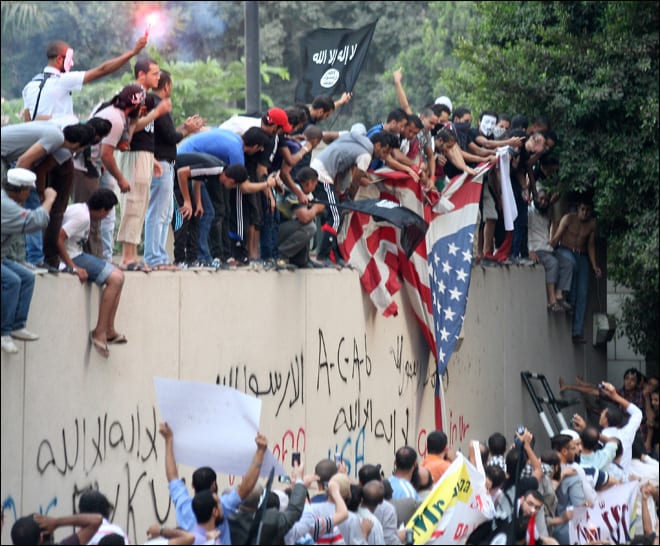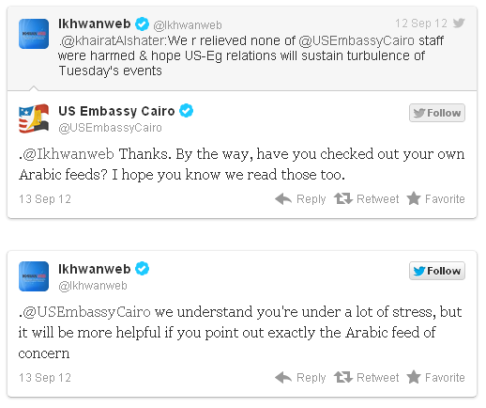
Tim Lowden questions the wisdom of Larry Schwartz, the Senior PAO in the U.S. Embassy in Cairo, employing snark in a twitter exchange with the Muslim Brotherhood following last week’s attack on the Embassy. In an interesting case of digital diplomacy, the MB had used its English-language Twitter feed to express sympathy to Embassy officials following the protests. Implicitly referring to the MB’s apparent tendency to adopt a more inflammatory tone in its Arabic tweets, Schwartz responded, “Thanks. By the way, have you checked out your own Arabic feeds? I hope you know we read those too.”
Tim found this response to be cheeky, undiplomatic, and counter-productive to dampening down tensions, especially as a response to a seemingly well-intentioned missive from the MB. Personally, I rather liked it. But I think the incident illustrates the difficulties the State Department and other governmental organizations face when using social media to interact with foreign publics and, in this case, governments.
There are several aspects of social media that make them particularly tricky for diplomats. First, they move in rapid, real time speed, with shelf lives and attention spans that are often even shorter than that of traditional media. This is at odds with a bureaucracy’s desire to vet all communications before making them public. By the time a 140 character tweet has made it up the administrative food chain, the subject has changed and State has lost the opportunity to engage in the conversation. Recognizing this, State has slowly allowed for a more spontaneous approach to social media at its embassies, especially when it comes to posting on Facebook walls and tweeting. As former Undersecretary of Public Diplomacy James Glassman writes in a smart post at Foreign Policy, Ambassadors are ultimately responsible for tweets from the Embassy, but staff is trusted to proceed with the understanding that no communication can question or contradict U.S. policy. Generally, this is never a problem. That doesn’t mean, however, that tweets and wall postings can’t cause embarrassment.
Of course, this is potentially true of any communication; after all, it was a standard press statement that got Schwartz and the embassy in trouble in the first place. Another problem for Diplomats engaging in the public sphere via new media is precisely what bothered Tim: Tone. Social media — especially Twitter — speaks in the language of snark. To be credible, diplomats don’t necessarily need to descend to the lowest form of discourse, but they do need to communicate colloquially and authentically to be seen as legitimate members of the online community. This is why I am not bothered by Schwartz’s tweet: I found it to be a nice way to make an important point that worked in the context of social media.The question of whether it “works” or not is another matter, though.
And therein lies another challenge social media pose for diplomats. Twitter, Facebook, and the like are simply tools in the strategic communication utility belt diplomats can use to engage with foreign publics. But like all forms of communication, they are ultimately meant to serve the strategic ends of, in this case, the U.S. government. The real value of social media, for instance, is a combination of mass information delivery system, and a way to humanize the U.S. government for potentially skeptical audiences who see America as aloof, or worse. Measuring effectiveness of these communications is difficult, to say the least.
Take Schwartz’s tweet. Did it serve the U.S. government’s interests? Well, if it annoyed the Egyptian authorities and people when the government was making a genuine effort to extend an olive branch, then maybe not. But if it simultaneously stood up for the principal that the U.S. won’t stand for alleged allies engaging in rhetoric that endangers U.S. personnel, while also putting a human voice — piqued though it may have been — to otherwise staid government communications, then perhaps the answer is yes. The problem is two-fold.
First, who is the audience? The answer is a combination of one’s intended audience, and everyone else that will see your message retweeted, liked, emailed, etc. In traditional strategic communication, one identifies a target audience and crafts a message likely to be persuasive to that group of people. In social media, even more than before, the audience quickly grows beyond your target, especially when communications go viral — a diplomat’s worst nightmare. This leads to the other challenge: Context. When a politician airs a political ad on TV, they have a pretty good idea of the context in which the audience is receiving that message. But embassy officials have little to no control over how their unintended audience — or even their intended audience — will be seeing their tweets. For instance, research across decades shows that one of the most important ways in which people understand news and information is through the prism of peers or elites they trust and agree with.
So if I see Schwartz’s tweet because I follow him, then I am likely to process it differently than if I have it retweeted by someone I trust but who I know is hostile to the United States. More to the point, perhaps I see the tweet in a blog post from a trusted source that goes into a lengthy rebuttal to Schwartz’s message. The point is that in a new media environment, the messenger has much less control over the reception of that message than they did in a traditional media world. This is even true for their “old” media communications, because they, too, are often sent on a roller coaster ride through the “interwebs.”
This is reminiscent of the “Twitter Wars” between ISAF PAOs in Afghanistan and, purportedly, Taliban officials in the last couple of years. The exchanges were marked by extreme sarcasm on both sides, as in this repartee:
 There are a couple of potential pitfalls exhibited in these exchanges. First, unlike Schwartz’s tweet, ISAF is in full-on Snark mode, to a point that I’m not sure works for them. When you are seen as an occupying force representing a host of imperial countries, it doesn’t really help win hearts and minds to in fact sound imperious. Put another way, this doesn’t seem to be furthering the strategic communication goals of ISAF. Second, it’s not clearthat the person tweeting here is really part of the Taliban, much less representing them. A coalition or government doesn’t look very credible if it’s arguing with an impersonator. A final problem posed by the Schwartz and ISAF cases is that these online squabbles are manna from heaven for the press, which loves conflict stories, especially if they allow reporters to write “gee whiz” stories about digital diplomacy gone awry. This can often fuel the story’s jet-packed ride to viral stardom.
There are a couple of potential pitfalls exhibited in these exchanges. First, unlike Schwartz’s tweet, ISAF is in full-on Snark mode, to a point that I’m not sure works for them. When you are seen as an occupying force representing a host of imperial countries, it doesn’t really help win hearts and minds to in fact sound imperious. Put another way, this doesn’t seem to be furthering the strategic communication goals of ISAF. Second, it’s not clearthat the person tweeting here is really part of the Taliban, much less representing them. A coalition or government doesn’t look very credible if it’s arguing with an impersonator. A final problem posed by the Schwartz and ISAF cases is that these online squabbles are manna from heaven for the press, which loves conflict stories, especially if they allow reporters to write “gee whiz” stories about digital diplomacy gone awry. This can often fuel the story’s jet-packed ride to viral stardom.
Then again, the press itself can not only engage in what we might call undiplomatic behavior, but discover the hard way the same perils of social media diplomats have faced. In a matter of hours on Monday, Newsweek published a grotesque cover wallowing in the worst stereotypes of the Muslim world with the headline “Muslim Rage,” then invited comments about the cover on Twitter: “Want to discuss our latest cover? Let’s hear it with the hashtag #MuslimRage.” Well, they heard it alright.
[tweet https://twitter.com/LibyaLiberty/status/247737358320037888 align=’center’]
[tweet https://twitter.com/HijabiGrlPrblms/status/247770260160266240 align=’center’]
[tweet https://twitter.com/TheDooda/status/247775994356842496 align=’center’]
[tweet https://twitter.com/monazmiahmad/status/247920922592423937 align=’center’]
Fortunately for Newsweek, a few hours and several thousand tweets later, Mitt Romney’s latest faux pas went viral and their own mishap began to travel down the memory hole, right on the heels of Larry Schwartz’s tweet. But in many ways, the damage had already been done.








